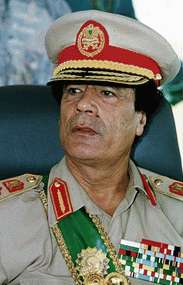Libya 1985-?

Colonel Muammar Qaddafi
By the end of the 1970s, the U.S. had come to see the regime of Muammar Qaddafi as systematically pursuing policies antithetical to those favored by Washington, i.e., as an enemy. When Reagan arrived in office in 1981, a new CIA assessment of Qaddafi declared him overextended in Chad , where several thousand of his troops were present. The U.S. response was to launch a covert operation to aid rebel forces in Chad (who were already being assisted by France and Egypt ) with arms, training, and funding; this later was accompanied, as we saw in earlier chapters, by encouragement of and logistical support to France in its Chadian military operations. In addition, Reagan approved the first of several efforts at goading Qaddafi into attacking U.S. military forces, in order to have an excuse for direct, overt strikes against him (see chapter six of the book for a discussion of those strikes). However, neither of these policies offered any significant near-term hope of overthrowing Qaddafi in Libya .
Several years later, new possibilities presented themselves. An exile group, founded in 1981, had for several years been aided by several states in the region as well as the French. (The U.S. aided these efforts by passing intelligence to Paris .) In 1984, the exiles launched two attacks on the regime. Both failed, though one of them, which was linked to a coup attempt did result in a genuine battle. This seemed to have triggered a U.S. reappraisal, with proposals being drafted for what presumably would have been a significantly higher level of U.S. support for the exiles. However, a number of policy makers considered the exiles too incompetent to serve as the basis for a large operation and the plans were shelved. A year later, they were revived following the hijacking of a U.S. jet, but this time, covert support of the exiles (Operation Tulip) was to be coupled with a contingency plan for an overt Egyptian invasion of Libya which the U.S. would support militarily (Operation Rose). As might be expected, the Egyptians were less than thrilled with the idea of starting war on an American schedule; meanwhile, the exile side of the plan, which received bare majority support in the congressional oversight committees, was leaked to the press. Nonetheless, Operation Tulip went ahead, but with no greater success than the French had had with their efforts. After another year had gone by and the exiles continued to fail, the U.S. finally began to consider an additional way of augmenting their efforts, this time by a massive propaganda and disinformation campaign (Operation Veil) that was supposed to frighten Qaddafi into thinking that additional U.S. military actions would soon be launched. The Iran-Contra scandal (see description elsewhere on this website) put an end to this proposal, though just how long after that the U.S. continued its support of exile raids is, at the time of this writing, impossible to determine. 1
1) Allen Dulles in National Security Council meeting, 23 April 1959, FRUS 1958-1960 , vol. 19: doc. 371; also docs. 279, 367-9, 373, 375, 378-80, 400; Colby in Special Group meeting, 19 September 1963, FRUS 1961-1963 , vol. 22: doc. 189; also docs. 79, 155; Galbraith quoted in Knaus (1999: 245); Memorandum for the Special Group, 9 January 1964, FRUS 1964-1968 , vol. 30: doc. 337; also doc. 342 (with a chronology of approvals); FRUS 1969-1976 , vol. 17: docs. 273-4, 278, 280; Prados (1996: ch. 9); Knaus (1999; 2003); Conboy and Morrison (2002); Garver (2004). The FRUS volumes contain only a handful of documents pertaining to STCIRCUS, several of which have been so extensively “sanitized” as to render them close to useless. An even more recent example of means-centered policy making is the conversion by the Indians of “their” Tibetans into an anti-terrorist unit (Conboy and Morrison 2002: 258).
